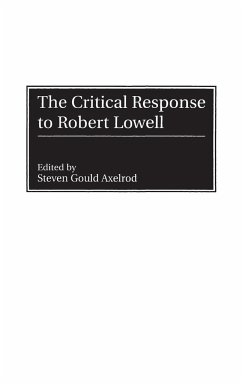
The Critical Response to Gloria Naylor
Versandkostenfrei!
Versandfertig in 1-2 Wochen
66,99 €
inkl. MwSt.

PAYBACK Punkte
33 °P sammeln!
As the author of The Women of Brewster Place, Linden Hills, Mama Day, and Bailey's Cafe, Gloria Naylor is widely respected as one of the most important contemporary African American women writers. This volume provides comprehensive coverage of the critical response to her works. The book is divided into sections devoted to each of Naylor's novels. Within each section, seminal articles and book chapters comment on her writing. Special attention is given to African American and feminist perspectives on her canon. In addition, many of the essays discuss the relationship of Naylor's novels to the ...
As the author of The Women of Brewster Place, Linden Hills, Mama Day, and Bailey's Cafe, Gloria Naylor is widely respected as one of the most important contemporary African American women writers. This volume provides comprehensive coverage of the critical response to her works. The book is divided into sections devoted to each of Naylor's novels. Within each section, seminal articles and book chapters comment on her writing. Special attention is given to African American and feminist perspectives on her canon. In addition, many of the essays discuss the relationship of Naylor's novels to the works of classical authors such as Chaucer, Dante, and Shakespeare, and to significant modern writers; thus, the volume charts her sources and influence. While some of the essays have appeared previously and are among the most important responses to her writings, the book also includes several original pieces. An exclusive interview with Naylor, an insightful introduction, and a substantial bibliography are special features of this reference work. A balance of new and previously published material provides a thoughtful overview of the reception of her works. A thorough introductory essay discusses Naylor's place in American literature and the themes she treats throughout her novels. A chronology summarizes the principal events in her life and career, and a substantial bibliography lists works for further reading. A special feature is an exclusive interview with Naylor, in which she discusses such topics as the role of the politics of gender in her writings, her treatment of women, the relationship between art and morality, her views on race relations, her thoughts on the future of literature and on her most recent projects, and the manner in which she works and writes.














